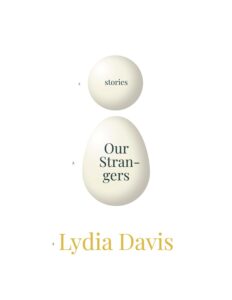In the story “Caramel Drizzle,” Lydia Davis begins with a simple but disorienting question, rendered in quotation marks and without attribution: “Caramel syrup or caramel drizzle?”

How are those choices, syrup and drizzle, different? On what or with what? It feels like a question that aims to confuse rather than clarify.
After a moment, you might decide that this is probably a barista asking how a customer’s coffee should be served. The story goes on, and, with each new word, the scenario takes on more dimension — a conversation overheard at an airport Starbucks; the woman ordering, wearing a blue uniform, is clearly a flight attendant.
The narrator is alarmed by this seemingly banal conversation, unable to shake the confusion of the question. An hour or so later, she is horrified as she observes the flight attendant “walking away with another airline employee, the empty cup in her hand, the caramel drizzle inside her.” Then, as she boards the flight: “She turns out to be the attendant on my flight — her name is Shannon. So, her caramel drizzle will also be going to Chicago with us.”
Such fictive gymnastics, both deeply cerebral and remarkably voyeuristic, lie at the heart of Our Strangers, the exquisite new story collection by Lydia Davis, who’s been described by the Cleveland Plain Dealer as “the master of a literary form largely of her own invention.” Some of her stories are only a sentence or two long, and yet each is extraordinarily thought-provoking. Our Strangers is out this month from Bookshop Editions. It is the publisher’s first book.
After watching the e-commerce landscape shift toward monopoly in recent years, Davis insisted that this volume not be available on Amazon. She chose Bookshop.org, whose mission is “to help local, independent bookstores thrive in the age of e-commerce.” The move makes sense for a literary maverick like Davis. She’s continually pushed boundaries.
Her many works deal with themes like the minutiae of living, the squalor of relationships, and the gulf between expectations and reality, all delivered with a droll yet plucky wit. This collection of stories, her first in a decade, demonstrates her style and reconfirms her skill.

Take, for example, “Master Builder,” which might sound familiar to denizens of the Outer Cape:
With most excellent workmanship
He is up there on his ladder,
With greatest care ruining
The oldest house in town.
Many of Davis’s stories involve a light skewering of suburban concerns: petty consumerism, inconsequential fame, the reliance upon the tiniest morsels of excitement to break up otherwise dull existences. But wry as she is, one of Davis’s greatest strengths is that she never teeters into cynicism or moralism. One gets the sense that even her most pathetic characters are not to blame for their circumstances and could be quickly redeemed at any time. You just caught them in a bad moment.
Davis delights in demolishing the loftiest of ivory towers — brainpower and learnedness don’t provide sanctuary in her world but often merely grant access to new arenas in which one can be further humbled and dismayed. This proclivity is on full display in “Pardon the Intrusion,” the showstopper of Our Strangers. At nearly 30 pages, it’s one of the longest pieces in the collection and consists of around 100 mini-paragraphs. As you read, it becomes clear that the story is drawn from individual messages on what appears to be an online faculty community board at a small college. This piece is a seemingly endless stream of provocative mundanities:
“We are looking for a mature female caregiver. Must have car.”
“Does anyone have a viola that I could borrow or rent for this weekend? It will be used for fiddle music not classical.”
“I need someone to clean the gutters on my house, help clean my gutters, or hold the ladder while I clean the gutters.”
Given the overload of facts and opinions on those of us soldiering on through the 21st century, nothing can be understood without context. And Davis knows this. By chiseling out slabs of context that provide crucial support to rather anodyne texts, she’s able to delineate how all communication is increasingly a product of our circumstances and, more often than not, devoid of any inherent meaning.
But Davis isn’t preaching doom. Her knack for contextlessness is so generous and amusing that the results come to feel far more like a salve than a screed. And even if communication remains hard and complacency remains easy, even if the world becomes seemingly more unintelligible with every passing day, we’re lucky to have a collection that revels in the confusion and, better, asks us to giggle at it.
